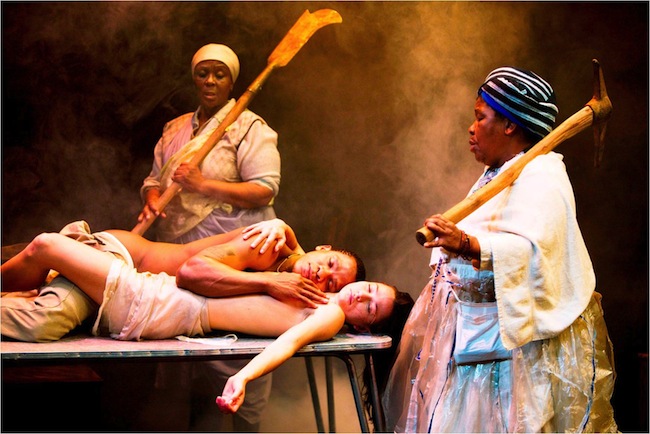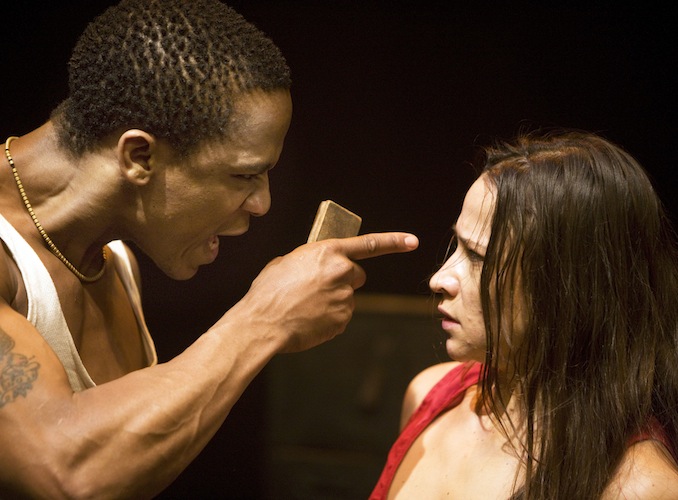Theater Review: “Mies Julie” — Writhing in the Danger Zone
In her compelling deconstruct/rewrite of “Miss Julie,” set in South Africa 18 years after the end of apartheid, director/dramatist Yaël Farber doubles down on the elemental energies of Greek tragedy.
Mies Julie, written and directed by Yaël Farber. Based on August Strindberg’s Miss Julie. Music composed by Daniel and Matthew Pencer. Produced by The Baxter Theatre Centre at the University of Cape Town and The South African State Theatre and presented by Arts Emerson at the Paramount Theater, Boston, MA, through December 8.
By Bill Marx
The conventional view of August Strindberg’s Miss Julie takes the playwright’s word that the text is “the first Naturalistic Tragedy in Swedish Drama.” Written to impress his hero Emile Zola, the playwright makes it clear that not only in France does life boil down to the survival of the fittest. When it comes to the battle of the sexes, men and women slug it out, via will rather than muscle, for supremacy. Even a critic as cagey as Eric Bentley characterizes the play as “a tragedy of Darwinian ethos.” Add Strindberg’s infatuation with arch woman-hating German philosopher Arthur Schopenhauer and juicy autobiographical confessions from the dramatist himself about his tempestuous marriage with actress Siri von Essen, who first acted the role of Miss Julie, and you have a neat package. Here is piece of classic social drama, biology and environment dooming the aristocratic Julie, who, after a bout of slumming, slits her throat at the behest of her lover/servant Jean.
But that categorization has always been too neat for this play. There’s a hallucinatory quality to Miss Julie — the title character hypnotizes herself into committing hari kari at the end. And the script’s concentrated action was inspired by Greek drama — 90 minutes long, a small cast, and use of music, song, and dance. Here is a miniaturized mini-series of sex and death, moving from erotic attraction, teasing, and kinky role-playing to coupling, the predictable falling out of love, the woman’s sexual disgust, and her demise. Nobody had done anything like that in the theater before, and Strindberg was justly proud of his accomplishment.
In her compelling deconstruct/rewrite of the play, set in South Africa 18 years after the end of apartheid (on Freedom Day, which commemorates the election of Nelson Mandela in 1994), director/dramatist Yaël Farber doubles down on the elemental energies of Greek tragedy. Her exploration of interracial desire, mutating into self-destruction because of continuing prejudice and injustice, is conveyed through dreamlike imagery, atonal music, and nimble gymnastics. Beginning in full Darwinian heat (nineteenth century repression begone), her version examines the racial and social hostilities of her homeland, probing the obstacles to freedom. The result is an always fascinating if overheated grudge match, the production’s undulating psychological ambivalence amplified and then sped-up to the point of where love and hate flash by like competing Olympic sprinters. But at time when our theater seems to be determined to stay small (and politely musical) for the sake of subscriber safety and commercial pats on the back, Mies Julie is an exhilarating venture into the danger zone.
From the beginning, Julie, the master’s daughter, flits with sensual impatience in and out of the kitchen of black servants John, who is cleaning the master’s boots, and his mother, Christine. The latter is a descendent of the initial black settlers of the land, their bodies buried underneath the floor. She also took care of Julie when she was a girl, no doubt noticing that John and Julie were smitten with each other yet were fated to be apart. On this night, with foreboding aplenty — a storm is a’coming and newborn pups to be killed — John and Julie have at each other with a confessional vengeance, sexually and rhetorically. They fire off recriminations and valentines, flash thighs and abs, collapse into loving clinches, slither and slide, bound onto and off the table, undulate, scream, and spit. A ghost parades around from time to time playing a stringed instrument instrument that resembles a bow, while Christine totters between trying to dig up the floor in order to free her wronged ancestors and heading off to attend a church that accepts the way things are.

Bongile Mantsai, Hilda Cronje, Thoko Ntshinga, Tandiwe Nofirst Lungisa in “Mies Julie.” Photo: Murdo MacLeod.
What would Strindberg think? Since the point of Miss Julie is that sadomaschism is what makes the world (and rutting) go round, he would no doubt be enthused by what Farber has done, though he might point out that there can be too much of a good/bad thing. Strindberg excels at the slow build, social masks serving as useful brakes on the fateful intensities of instinct. Farber is an impatient postmodern, so she cuts to the visceral chase again and again. What’s more, she heaps conflicts on her character’s plates, writing in the program notes that in this adaptation she wanted to take on “the myriad issues that face us as South Africans. Mother, land, body.” Laudable ambition, but continually thumping the connections between pleasure and pain and love and hate becomes mechanical when they have to cover so much political territory, especially when decades of historical oppression and social punishments have to be explicated during a superheated commingling.
But the performers (Bongile Mantsai as John and Hilda Cronje as Julie) rise above the thematic frenzy, moving with an impressively athletic, libido-driven grace. These are Tiger Shrikes that transform into Lovebirds and back again, locked in a cage of a kitchen that seems to be some sort of primal arena sitting on a rug of earth. These attractive performers generate enough sweaty heat to actually earn the worn adjective ‘steamy,’ even when they are careening about the stage for no reason aside from Farber’s version of the ritual heebie jeebies. An ironic counterpart to Julie, Thoko Ntshinga’s Christine nicely balances salt of the earth with bedeviled victim of crimes. Tandiwe Nofirst Lungisa makes for a suitably resonant apparition from the past.
Many critics have had a problem with Strindberg’s original ending, and Farber has come up with a convincing rationale for why Julie ends her life. As played by Cronje, the tortured Julie is too filled with self-loathing to be part of the future — she cannot conceive of a world of freedom. Farber’s John is a far more substantial figure than Jean — Mantsai makes him more sympathetic, less casually cruel than Strindberg’s servant, whose dreams begin and end with running a hotel. Thus Strindberg’s tragedy is no longer just Julie’s (whose death is seen as the heroic way out of an evolutionary dead end), but John’s as well. Farber comes to Arts Emerson with the usual reams of international hype and awards proclaiming that she has “a reputation for hard-hitting, controversial works of the highest artistic standard.” For once, the excitement is justified.
Bill Marx is the Editor-in-chief of the Arts Fuse. For over three decades, he has written about arts and culture for print, broadcast, and online. He has regularly reviewed theater for National Public Radio Station WBUR and the Boston Globe. He created and edited WBUR Online Arts, a cultural webzine that in 2004 won an Online Journalism Award for Specialty Journalism. In 2007 he created the Arts Fuse, an online magazine dedicated to covering arts and culture in Boston and throughout New England.

